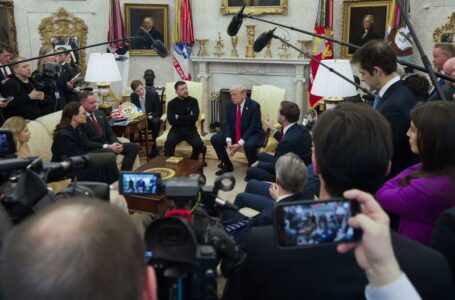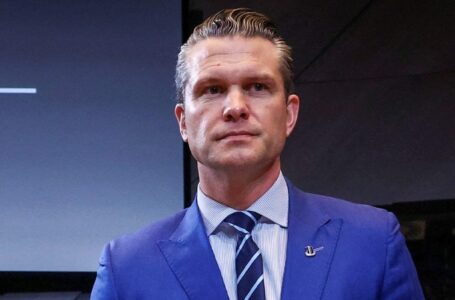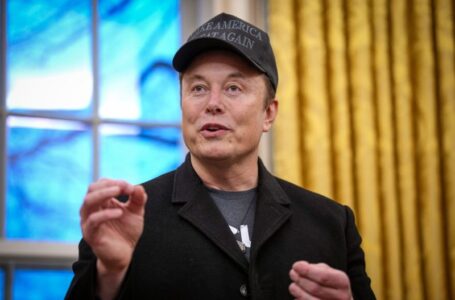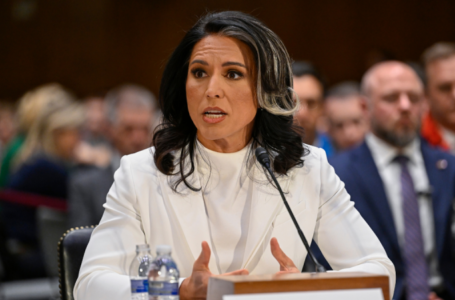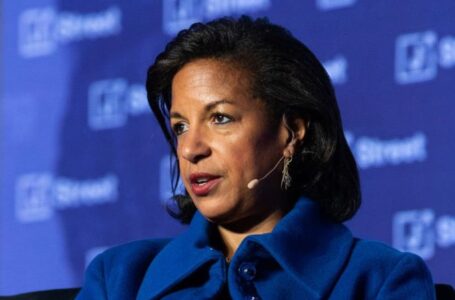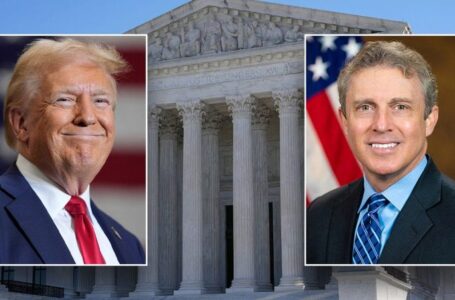5 key takeaways from a frenetic weekend of Ukraine diplomacy
Far right wins first round of France’s parliamentary election in blow to Macron, projection shows
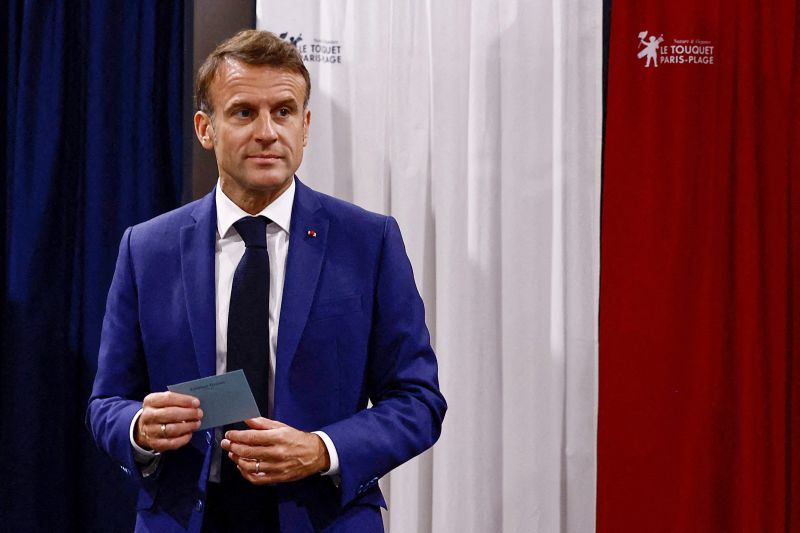

Marine Le Pen’s far-right National Rally (RN) party has taken the lead in the first round of France’s parliamentary elections on Sunday, initial projections showed, taking it closer to the gates of power than ever before.
After unusually high turnout, the RN bloc won with 34% of the vote, while left-wing New Popular Front (NFP) coalition came second with 28.1% and President Emmanuel Macron’s Ensemble alliance slumped to a dismal third with 20.3%, according to initial estimates by Ipsos.
While the RN appears on track to win the most seats in the National Assembly, it may fall short of the 289 seats required for an absolute majority, suggesting France may be heading for a hung parliament and more political uncertainty.
Projections show that, after the second round of voting next Sunday, the RN would win between 230 and 280 seats in the 577-seat lower house – a staggering rise from its count of 88 in the outgoing parliament. The NFP was projected to secure between 125 and 165 seats, with Ensemble trailing with between 70 and 100 seats.
The election, which Macron called after his party was battered by the RN in European Parliament elections earlier this month, could leave him to see out the remaining three years of his presidential term in an awkward partnership with a prime minister from an opposition party.
The RN election party in the northern town of Henin Beaumont erupted in celebration as the results were announced – but Marine Le Pen was quick to stress that next Sunday’s vote will be key.
“Democracy has spoken, and the French people have placed the National Rally and its allies in first place – and has practically erased the Macronist bloc,” she told a jubilant crowd, adding: “Nothing has been won – and the second round will be decisive.”
In a speech at the RN’s headquarters in Paris, Jordan Bardella, the party’s 28-year-old leader and its to become prime minister, echoed Le Pen’s message.
“The vote taking place next Sunday is one of the most decisive in the entire history of the Fifth Republic,” Bardella said.
In bullish speeches before the first round, Bardella said he would refuse to govern a minority government, in which the RN would require the votes of allies to pass laws. If the RN falls short of an absolute majority and Bardella stays true to his word, Macron might then have to search for a prime minister on the hard left, or somewhere else entirely to form a technocratic government.
Cordon sanitaire
A week of political bargaining will now ensue, as centrist and left-wing parties decide whether or not to stand down in individual seats to block the nationalist and anti-immigrant RN – long a pariah in French politics – from winning a majority.
When the RN – under its previous name, the National Front – has performed strongly in the first round of votes in the past, left-wing and centrist parties have previously united to block them from taking office, under a principle known as the “cordon sanitaire.”
After Jean-Marie Le Pen – the father of Marine and decades-long leader of the National Front – unexpectedly defeated the Socialist candidate Lionel Jospin in the 2002 presidential election, the Socialists swung their weight behind the center-right candidate Jacques Chirac, delivering him a landslide in the second-round runoff.
In an attempt to deny the RN a majority, the NFP – a left-wing coalition that formed earlier this month – promised it will withdraw all of its candidates who came in third place in the first round.
“Our instruction is clear – not one more vote, not one more seat for the National Rally,” Jean-Luc Melenchon, the leader of France Unbowed – the largest party in the NFP – told supporters Sunday.
“A long week awaits us ahead, everyone will take his or her decision with conscience, this decision will determine, in the long-term, the future of our country and each one of our destinies,” Melenchon added.
It is not yet clear if Macron’s allies will return the favor and call on their supporters to support the NFP in constituencies where Ensemble trails in third. Marine Tondelier, leader of the Green Party – a more moderate part of the NFP – made a personal plea to Macron to stand down in certain seats to deny the RN a majority.
“We’re counting on you: withdraw if you come third in a three-way race, and if you don’t qualify for the second round, call your supporters to vote for a candidate who supports republican values,” she said.
A huge gamble
Macron’s decision to call a snap election – France’s first since 1997 – took the country and even his closest allies by surprise. Sunday’s vote was held three years earlier than necessary and just three weeks after Macron’s Renaissance party was trounced by the RN at the European Parliament elections.
Macron has pledged to see out the remainder of his final presidential term, which runs until 2027, but he now faces the prospect of having to appoint a prime minister from an opposition party – in a rare arrangement known as “cohabitation.”
The French government faces little trouble in passing laws when the president and majority in parliament belong to the same party. When they don’t, things can grind to a halt. While the president determines the country’s foreign, Europe and defense policy, the parliamentary majority is responsible for passing domestic laws, like pensions and taxation.
But these remits could overlap, potentially sending France into a constitutional crisis. Bardella, for instance, has ruled out sending troops to help Ukraine resist Russia’s invasion – an idea floated by Macron – and said he would not allow Kyiv to use French military equipment to strike targets inside Russia. It is unclear whose will would prevail in disputes like this, where the line between domestic and foreign policy is blurred.
A far-right government could spell a financial as well as constitutional crisis. The RN has made lavish spending pledges – from rolling back Macron’s pension reforms to cutting taxes on fuel, gas and electricity – at a time when France’s budget might be brutally slashed by Brussels.
With one of the highest deficits in the Eurozone, France may need to embark on a period of austerity to avoid falling foul of the European Commission’s new fiscal rules. But, if implemented, the RN’s spending plans would make France’s deficit soar – a prospect that has alarmed the bond markets and led to warnings of a “Liz Truss-style financial crisis,” referring to the shortest-serving prime minister in British history.
In a terse statement Sunday evening, Macron said the high turnout showed French voters’ “desire to clarify the political situation” and called for his supporters to rally in the second round.
“Faced with the National Rally, the time has come for a broad, clearly democratic and Republican rally for the second round,” he said.

